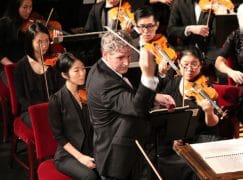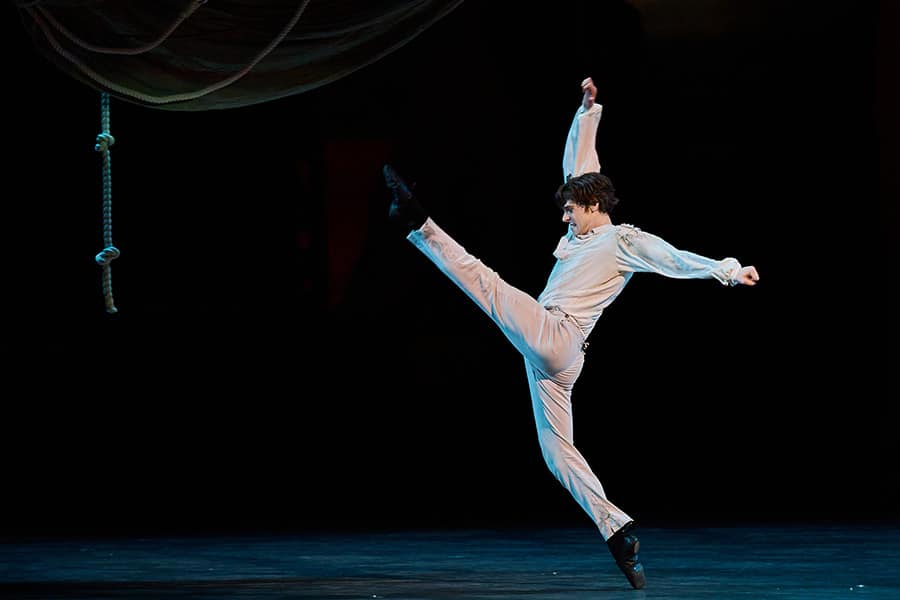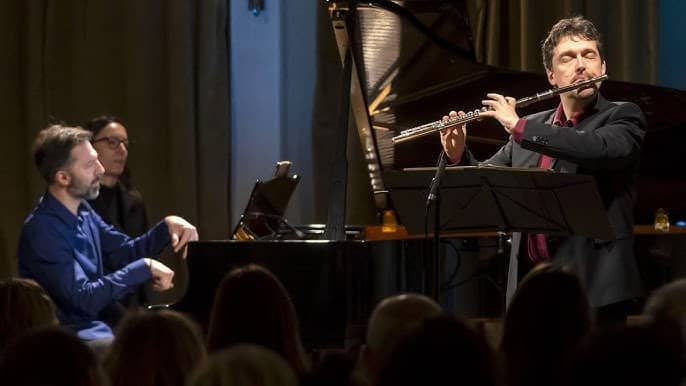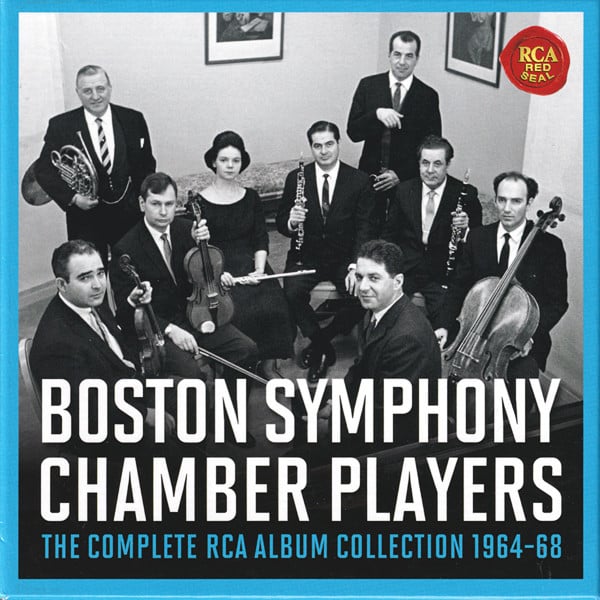Are these America’s top 20 college orchestras?
mainYou’d expect to find Juilliard, Curtis and Yale in there.
But Rice University, Baylor and St Olaf at the top of the pile?
This is some list.
Who’s missing?

picture: Mannes, David Hayes

You’d expect to find Juilliard, Curtis and Yale in there.
But Rice University, Baylor and St Olaf at the top of the pile?
This is some list.
Who’s missing?

picture: Mannes, David Hayes
The press service of the Mariinsky Theater has…

From the general manager’s self-admiring Sunday sermon in…

From the French magazine le canard enchainé, under…

The death has been announced, aged 94, of…

Session expired
Please log in again. The login page will open in a new tab. After logging in you can close it and return to this page.
Well for one thing, Princeton Symphony Orchestra isn’t affiliated with the university. The university’s orchestra is Princeton University Orchestra.
The University of North Texas Orchestra absolutely deserves to be included in this very subjective list. Texas is well represented.
Having matriculated there (UNT) for 2+ years, I can ‘second’ that opinion.
GC
Sorry, but I’m “Gerrie” – not Geraldine.
MIT has a pretty good student symphony orchestra for a technical university.
If you had heard the Rice University Orchestra(s) and/or bothered to look into the regard in which the program is held, you wouldn’t make such a statement. Having attended the Eastman School of Music in the early 1980s, I never thought I would hear a college orchestra surpass what David Effron achieved back then (of course which the help of the strong wind and brass studios at that time), but Larry Rachleff has done just that. It’s also a huge calling card for prospective students now, who know they’ll be part of a program that need take a back seat to none.
I thought reporting/commenting on these articles you share was supposed to be informed by some knowledge of the subject rather than a knee jerk “how could that be” reaction? Thanks for posting, in any case.
Exactly! Shepherd School of Music at Rice has top-tier faculty and attracts the highest caliber of students. I would have been surprised had they not been included on such a list.
I am not in the least surprised about Larry Rachleff’s job at Rice. He just finished a memorable 21 year tenure with the Rhode Island Philharmonic. Under his direction, they reliably gave deeply musical and most satisfying performances. Everyone says he significantly raised the orchestra’s technical standards. I can believe it.
Well, yes … These are logical choices.
The question is: Which orchestras would you add to this list that aren’t shown? None that came to my mind.
This list is absurd. Some of these are, to be charitable, second tier music programs so how can their orchestras be in the top 20? Wheaton College? Cornell? Baylor? Yikes.
Mannes is listed but not Manhattan School of Music or New England Conservatory? Yikes.
Some of the descriptions sound like they were lifted verbatim from press releases or the conductor’s own bios.
On the other hand, the University of Michigan has a fine top tier music school, yet seems chronically unable to “field” a top level orchestra. I wouldn’t put the University of Houston in the top 20 music schools, but their orchestra is even worse than you would think….it’s among the worst I’ve heard from a “major” school. Yes, it’s about the quality of the individual studios, but sometimes a lack of synergy, and poor leadership and motivation leads to less than the sum of parts.
Well, there is the University of Michigan’s 2006 Grammy award for Best Classical Album…but, of course, that’s no “American Prize”…
The University of Michigan Symphony Orchestra, and their conductor, Kenneth Kiesler, won The American Prize in Orchestral Performance and in Orchestral Conducting (college/university division) in 2011, for their remarkable Mahler 6.
As I wrote earlier, this is a subjective list, of course, and there are plenty of omissions, but no one should denigrate any orchestral program without hearing it first. There are some spectacular ensembles in this country, in some unlikely places, waiting to be discovered.
As for The American Prize Nonprofit Competitions in the Performing Arts, discovering excellence is part of our mission. We have been evaluating orchestras since 2010 based on annual submitted recordings. The judging is peer-based, and of course only orchestras who apply are considered in their particular year, but to assume that there are only great programs in certain places and at certain schools is narrow-minded, at best.
David Katz, chief judge
The American Prize
http://www.theamericanprize.org
I concur regarding NEC especially. I’ve heard both Curtis and NEC; I lived in Phila and heard Curtis play on their infrequent performances. Since moving to the Boston area I’ve heard NEC, who play almost every week and they are by far the superior orchestra. They are technically first rate and their ensemble is much cleaner than Curtis, mainly because Curtis sounds like a bunch of soloists. It’s not dissimilar to comparing the Westminster Symphonic Choir to the Met opera chorus.
Cornell, Ivy League like Yale has an excellent music department.
Excellent, no doubt, for academic areas but Cornell is hardly a place to go to be training for a career as a professional musician.
Many years ago — late 1940s through early ’60s — Ithaca College was one of the very best places for music education and countless public school music teachers in the Northeast studied there. But, when the State University of NY system opened, and schools like Potsdam and Fredonia could offer excellent music ed. programs at a fraction of the cost, Ithaca’s importance declined.
I say again: this list is a joke.
How could Indiana University not be included in this list? Incredible omission!
AGREE
To even compile such a list you would have to listen to well over 50 different college orchestras *multiple times* each and, to make it more fair, in the same hall. Yeah, that’s not going to happen. Even then, there would be wide disagreement. So such a list is ridiculous on its face.
I’ve studied the major music school’s symphony orchestras on YouTube with great interest and in reference sound. Hundreds of videos.
This list is pretty silly with some orchestras not affiliated with the school or the name incorrect (Eastman Philharmonia, as example).
A few pleasant surprises were St Olaf’s and Baylor, both featuring excellent orchestras.
Check out Rice’s Bartok Concerto for Orchestra to demo the excellence going on there.
University of Minnesota’s Daphnis is wonderful.
Juilliard and Curtis have a few very fine performances.
Europe? RCM’s Daphnis with Haitink is quite superb.
Best I’ve heard?
Royal Academy/Thielemann Tod und Verklarung
Eastman Philharmonia/Varon Prokofiev 5
I remember playing the Rite in London in the early 80s. Now, the Eastman sax choir does it in a superb arrangement from memory!
The Eastman School has two orchestras. The Eastman School Symphony Orchestra is the freshman/sophomore orchestra, and is very excellent. The Eastman Philarmonia is the junior/senior orchestra, and is spectacular. Neil Varon, the Professor of Conducting, is a terrific mentor, who achieves great results using kindness and reason, rather than fear and loathing. He follows in the footsteps of the late, lamented Mendi Rodan, who was the interim Professor of Conducting at ESM, and one of the nicest people I’ve ever seen on the podium. [He regularly addressed his 18-year-old students, fresh from high school, as “my dear colleagues”, and you could tell he meant it.]
If you’ve ever played under Varon’s baton at Eastman you should know that it is quite the contrary, i.e. horrible mentor and no kindness/reason. Its sounds more like you are a personal friend
I conduct a college orchestra not on this list and studied music at two universities, also not on the list. Neither myself nor my orchestra ever won something called the “American Prize”.
Happy for those “on the list”. I hope they understand how little it matters.
+1
They forgot to add one or more of Indiana University’s 4 full sized orchestras. ☺
Rice is a top tier school, it regularly takes students away from Juilliard. Leaving aside the oddity of having omitted some big name American conservatories, the fact is that that lists are always idiotic and few people have heard enough of the school orchestras to compare them. I mean, how many here have heard the NEC or Eastman or MSM or Colburn or Thornton or Mannes orchestras perform in recent times, to be able to make any judgment.
I would imagine pretty much all of the major American conservatories have orchestras that sound surprisingly great. One could simply have listed them all and left it at that. And as for those who think Curtis or Colburn or Juilliard are better than say IU or Mannes or NEC or Peabody, I would like to see that proven by a blind listening test.
What is more interesting is the curriculum and faculties. I am sure all the orchestra programs of the major American conservatories are excellent
How about the Crane School of Music Symphony at the State University of New York at Potsdam New York?
If only certain blog hosts and posters would bother to read the description preceding this list, misinformed comments would be minimized. From the introduction:
“This post looks at 20 of the most impressive college symphony orchestras in America. Because there is such a diversity between colleges, conservatories and universities, evaluating the quality of a given orchestra can be quite subjective. Our criteria for inclusion will give special emphasis to conductors. As maestros of symphonic sound, conductors play a central role in any orchestra, largely determining a symphony’s quality and artistic power. Other key factors in our evaluation of the most impressive college orchestras in America are the reputation of the institution, the awards an orchestra has received and the history of the orchestra.”
First of all, it is not an ordered list, so Rice, Baylor, and St. Olaf are not at “the top of the heap.” Even so, the Shepherd School Symphony could very well be listed first, as many who have actually heard it consider it the finest college symphony in America. Larry Rachleff is without equal as a music educator, and Rice has an unmatched record of placing its graduates in professional orchestras. Baylor and St. Olaf have excellent orchestras, as do the others on this list. None merit the disparagement of malcontent posters.
Music education is at an all-time high level in the United States, with many superb college orchestras providing the evidence. This is something to celebrate.
This list seems to include both apples and oranges; major conservatories and regular universities that may not have great music schools but still have surprisingly good student orchestras. It’s been 20 years, but I was blown away by the Harvard-Radcliffe Orchestra in the mid-90s. Not necessarily as good, player-for-player, as the NEC orchestra that I heard around the same time, but impressive for their engagement and that fact that these were students who obviously were talented instrumentalists but for whom music was important, but not a likely career path.
The key takeaway really should be that college orchestras are usually worth going to hear; you’ll hear a surprisingly high quality of play and, cliche that it might be, you might sense more engagement than from most professional orchestras; they’re not playing Brahms 1 for the 50th time.
+1.
I’ve heard more than one person say that attending concerts by the Peabody Conservatory Orchestra can be more fulfilling than what’s being presented up the street at the Baltimore Symphony.
It isn’t just musical skill that counts; it’s also the freshness and passion undergirding the performances.
Not sure how this was found, but it’s very useful in pointing out just how a college orchestra might affect the arts culture in the surrounding area.
I was a regular orchestra member at three larger state universities: Indiana University – whose top orchestra easily qualifies for this list, and Universities of New Mexico & Utah, whose top orchestras would probably not qualify. The quality of the conducting varied just as much as the students’ abilities, and not in a correlating way.
However, what tied them together was the meager attendance at all of our concerts. Usually, the better conductors made sure to advertise properly, and so would gather more of an audience. Nevertheless, I wish arts departments and the Universities behind them had a better understanding of the talent and passion they have in these ensembles, and do more to feature them in community concerts and outreach initiatives.
When I was in Boston in the mid-90s, the Carnegie-Mellon orchestra came to Symphony Hall to play Turangalila. Sparsely-attended – no surprise given the piece and that the orchestra wasn’t known – but a terrific performance. I’ll never forget a lady in the ticket line who, after buying a ticket, finally looked at it, then said to the cashier: “I thought I was coming to hear Emmanuel Ax!” I wanted to tell her she should take her chances with Turangalila.
They rehearse all year long for a couple of pieces, drilled in studio classes, coached by professors who are principal chairs at nearby top flight orchestras, of course a college orchestra can sound really really good.
What distinguishes each tier of orchestra is the amount of rehearsal (and faculty support) and the programming load for the season.
So the odd man out is Chicago among the Big Five cities.
Why doesn’t Chicago have good college orchestras given the presence of the Chicago Symphony, the Lyric Opera?
Northwestern has a music school. The U of C doesn’t. Lot of CSO players teach at Roosevelt whom no one has ever heard of.
They have that Chicago Civic Orchestra.
It’s not a college orchestra.
Northwestern undoubtedly has an excellent orchestra, and probably DePaul, too. This is just one person’s list. The more interesting point is that a small liberal-arts college like St. Olaf or Wheaton could possibly have an orchestra that plays on a comparable level to that of a major conservatory. Though I suspect not really.
This is a subjective list, of course, and there are plenty of omissions, but no one should denigrate any orchestral program without hearing it first. There are some spectacular ensembles in this country, in some unlikely places, waiting to be discovered. As for The American Prize, the nonprofit competitions in the performing arts, discovering excellence is part of our mission. We have been evaluating orchestras since 2010 based on annual submitted recordings. The judging is peer-based, and of course only orchestras who apply are considered, but to assume that there are only great programs in certain places and at certain schools is narrow-minded, at best.
David Katz, chief judge, The American Prize National Nonprofit Competitions in the Performing Arts http://www.theamericanprize.org
Well, I think that you’re all a load of idiots. This list is from a website for online/distance learning and as far as I know has no credibility whatsoever. Whatever the college and wherever they are placed on some spurious list isn’t what matters – it’s the experience the student has and the learning opportunities. As ever, more Cock and Bull.
Curiously, here in Philadelphia, the Temple University Symphony (a state university) is massively better than the University of Pennsylvania Symphony (an Ivy League institution).
University of Pennsylvania has a composition department but not an applied music major. The best minds may go to Penn, but for training on an instrument, there is Curtis and Temple (or University of the Arts for non-classical training).
Thanks, I always wondered why that was.
TEMPLE has performance as a major.Upenn does not
Temple, but the way, is an excellent orchestra. I remember a marvellous performance of Corigliano’s “Symphony #1,” which, if I remember correctly, was the Philadelphia premier.
This list is bushwah.
Things must have really changed since I taught at the Lamont School of Music in the 80s. It was not a school that would have a “Top 20” orchestra. And Western Michigan but not U of Michigan? Ann Arbor must have taken a giant fall. Glad to know there are lots of great music schools with great orchestral programs. It’s just a shame that there are so few paying jobs when they get out of school.
I’m a rice graduate, as well as Indiana University and I just say Rice absolutely deserves to be at the top of that list. Fantastic orchestral program with students constantly winning jobs all over the country!
Arizona State University. Great music school program even in 110 degree weather.
Has the person who made the list actually listened to these college orchestras before listing them?
This is bizarre. The Eastman School Symphony (freshmen and sophomores), but not the Eastman Philharmonia? A number of the schools on the list have very good orchestras, but certainly not at the level of ESM, Curtis, Juilliard, etc.
I also suspect some great university orchestras like Indiana, also several West Coast schools should be on the list.
Having omitted other conservatories from the list, it is clearly an advertorial sort of piece, either paid listings, or ones reflecting who advertises and who doesn’t. While regional schools all over the county no doubt have fine orchestras, including both Ithaca and Cornell is highly suspicious. Pay no mind.
I am an alum of St. Olaf and very proud member of the orchestra there during my tenure, and am now a freelance cellist in MN. When people question how such a small liberal arts college could possibly compete with the conservatories, the Miracle on Ice hockey team comes to mind. Without doubt, you need a certain level of playing chops to handle standard symphonic repertoire. But equally, if not more important, is the ability to work together, to modify your playing, to put your ego aside and truly play as an ensemble. If you get that, combined with a gifted conductor such as Steve Amundson, there is no limit to what you can accomplish. That is what makes the St. Olaf Orchestra so great, given the small size of the school.
This list is bollocks.
hate to say it, but I’m a graduate student at Mannes now and the orchestra is terrible, with some rare exceptions when the strings remember how to count